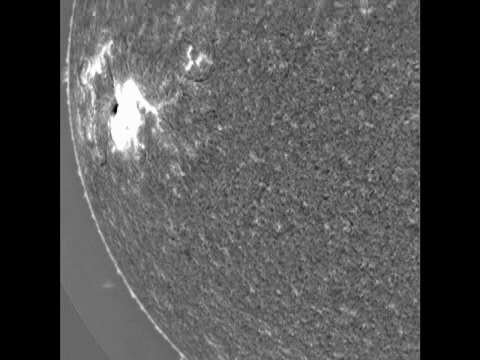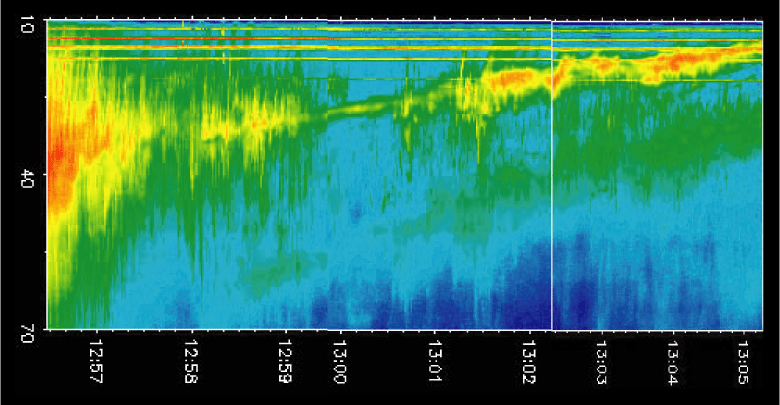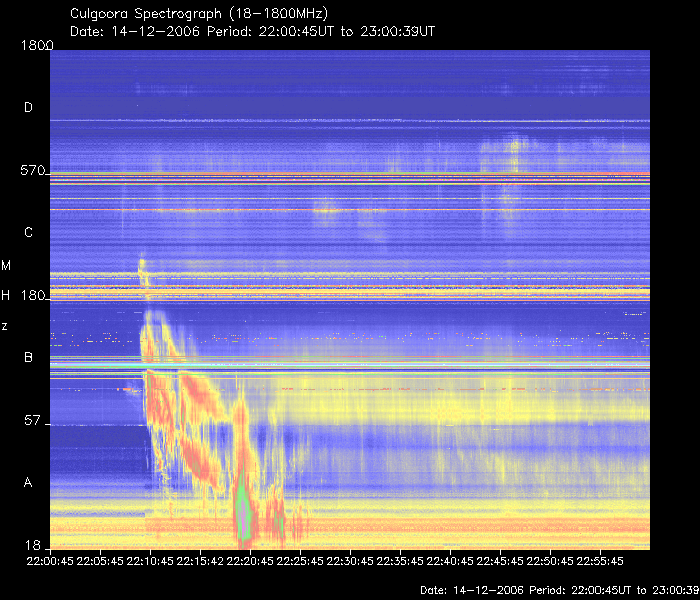
Have you ever heard the Sun?
We observe the Sun in New Mexico with a multi-frequency radiotelescope that has been modified
and customized for binaural audio recording. Here is a collection of specimen sound files of the
major types of solar radio emissions from some significant events in recent years.
:
:
:
Headphones or speakers with good stereo separation encouraged for strongest and most intricate pulsation experience.
Moderate to loud volume encouraged but please don't hurt your ears!
:
:
:
Observer's Comment: February 17, 2010
The Sun is currently emerging out of a very long period of "sunspot minimum" and a new solar cycle has now begun.
Fresh activity is now happening and I will be manifesting a new website to accommodate it all. - Thomas Ashcraft
Specimens
November 6, 2006 A Very Fast Solar Shock Front Today and Coronal Mass Ejection
There was a C9.7 solar X-ray flare today that caused moderate to strong Type II bursting from 1740 to 1749 UT. This flare event is still
being analyzed as I write. Below is an audio file recorded in stereo of the strongest part of this solar shockwave event that occurred between
1744 UT and 1748 UT. Recorded at 18.7 MHz one one channel and 22.2 MHz on the other channel. This was a particularly
fast Type II radio burst event recorded traveling from the Sun at 2230 kilometres per second! It sounds like a freight train rolling through.
November 6_2006_1747ut peak.mp3 3 minutes 59 seconds 5.6 MB
December 6, 2006 An X6.5 X-Ray Solar Flare and a rare Moreton Wave
Wow. This is supposed to be the time of solar sunspot minimum but a new spot group has emerged - region 10930 - and it just blasted out its second X-class flare.
We captured the shockfront of this X6.5 flare at 1843 UT and you can hear it below recorded at 22 MHz.
The shockfront and super-complex solar plasma oscillations kick in at about 19 seconds into the sound file.
SDec6_06X6 1843UT22MHz.mp3 1 minute 39 seconds 2.3 MB ( mono this time) 1843-1844 UT
:
:
:
:
Below is a 9 frame film of this rare Moreton Wave that flowed out of the X6.5 from 1843 UT through 1851 UT.

Credit: NSO/AURA/NSF and USAF Research Laboratory.
July 5, 2006
There is a dynamic sunspot group on the Sun today and it has been producing many moderate to strong radio bursts
the past three days. This Type V emission was one of the strongest so far. Recorded in stereo at 18.7 MHz and 22.2 MHz.
If you listen closely you will hear the burst hit one one stereo channel then a split second later hit the other as
the burst drifts down in frequency.
July 5, 2006 1743 UT
Type V solar burst
1 minute 24 seconds
2 Mb size
September 13, 2005 2034 UT
Possible Type V burst in the midst of a Coronal Mass Ejection.
1 min 15 sec
( strong )
September 15,
2005 Ultimate Type V Pulsations
Strongest Type V burst I have recorded in ten years.
2 min 40 sec
Strongest Type V burst I have recorded in ten years.
2 min 40 sec
September 7, 2005 X18 Type II Shockfront
(4th largest solar flare in recorded history)
3 minutes
September 9, 2005 X6.2 Type II Radio Sweep Excerpt
1 min 49 sec
August 22, 2005 Coronal Mass Ejection
Early activity from developing sunspot region 10798
( note : 10 minutes long 9.9 Mb in size )
September 13, 2005 Dynamic Solar Continuum Storming
1 minute 10 seconds
September 12, 2005 Solar Continuum Storm Excerpt
1 minute 44 seconds
September 12, 2005 Moderate Type V Radio Burst
1 minute 11 seconds
September 13, 2005 X1.5 Solar Flare Type V Burst
1 minute
Possible burst episode from region 798 / 808 / 814 (?)
Still being analyzed :
October 12, 2005 Radio Sweeps
1 minute 9 seconds
Type V Solar Emission ( Langmuir
Waves )
April
2, 2001 Type II X20+ Shock Front
(2nd largest solar flare in recorded
history)
( SOHO Page
)
Type III Solar Emission ( Electron
Bursts )

May 19, 2007 A Strong Event during Solar Minimum. Nice.
Click for May 19 Audio Page

Credit : IPS Radio and Space Services, Australia.
December 14, 2006 2200 UT And yet another X Flare from Region 10930!
We were lucky to catch a slice of these powerful solar radio sweeps at 22 MHz while the Sun was still in our antenna beams. The full radio
event was a complex mix of Type II, Type IV and Type V radio emissions and we caught the hottest part of the complex at 2220 UT.
Here is an excerpt and the sound takes off at about 15 seconds into the sound file.
SDec14_06X1.5 2220ut 22MHz.mp 1 minute 49 seconds 2.4 MB
:
:Thomas Ashcraft
35.50 North Lat. 105.89 West Longitude
For further information write to:
Back to Heliotown